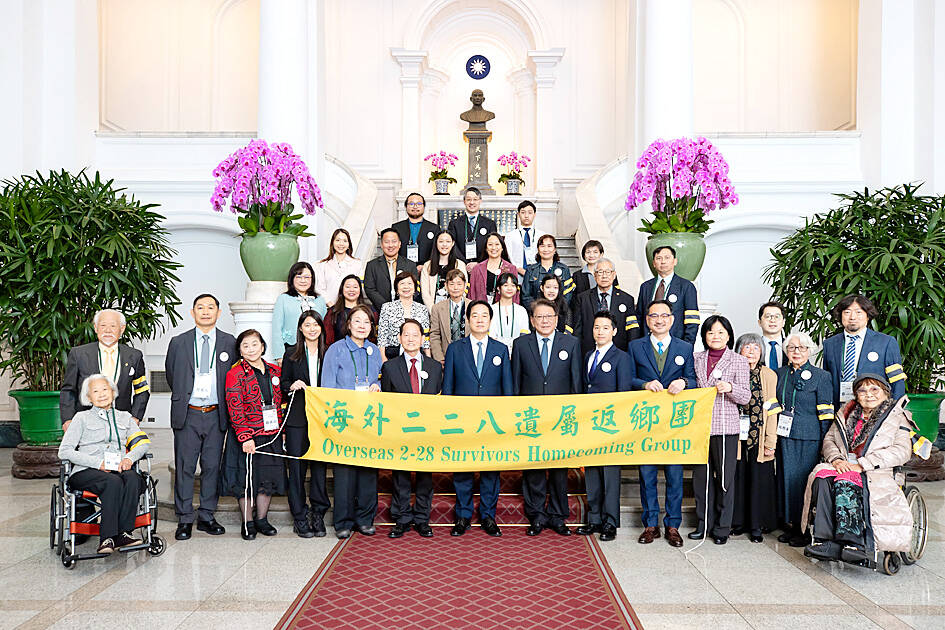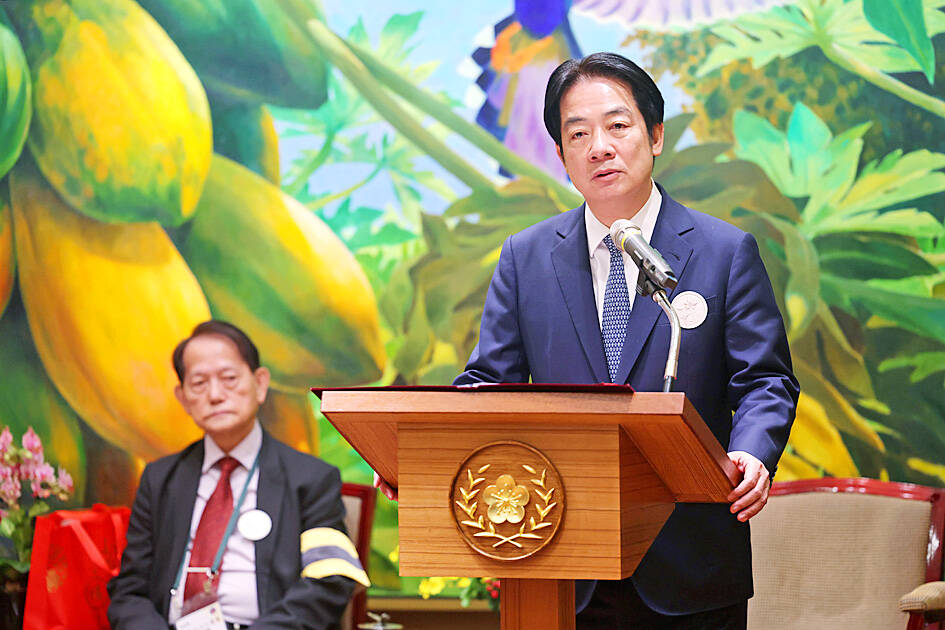Taiwanese should not forget history, must protect Taiwan’s freedom and sovereignty, be the masters of their own country and never allow something like the 228 Incident to happen again, President William Lai (賴清德) said yesterday.
Lai made the remarks at a meeting with members of the Overseas 2-28 Survivors Homecoming Group at the Presidential Office in Taipei.
Lai said he would like to express on behalf of the public a sincere welcome to members returning to Taiwan to attend the government’s 228 Incident memorial ceremony this year.

Photo: CNA
It has been 78 years since the incident, and many survivors have been working for the rehabilitation of the victims of the 228 Incident and speaking up for Taiwan, he said, adding that he is very grateful for their efforts and, with a solemn heart, he joins them in commemorating the victims.
Taiwan suffered immensely from the 228 Incident and the generational trauma has been passed down to today, he said.
Many social elites of that time had “disappeared,” including Wang Yu-lin (王育霖), who was the first Taiwanese prosecutor during the Japanese colonial period; Shi Jiang-nan (施江南), who was the youngest person to receive a doctorate in medicine at the time; and dentist Yang A-shou (楊阿壽), Lai said.

Photo: CNA
They also included Taiwanese artist Chen Cheng-po (陳澄波), who was a pioneer in the development of modern art in Taiwan; Wang Ping-shui (王平水), a successful entrepreneur and district representative; lawyer Lin Lien-tsung (林連宗); and teacher Lin Kuang-chien (林光前), among other outstanding and important people, he said.
The death of these social elites had caused an incalculable loss to Taiwanese society, so he again apologizes to everyone on behalf of the government, the president said.
He ensured that the government would continue to carry out remedial measures, including admitting culpability, apologizing, compensating, seeking the truth, restitution of reputation, and establishing memorial halls and monuments.
It is the efforts of survivors, particularly Kenneth Wang (王克雄), who has in the past several decades persistently urged society to face this scar in history, that have led to the transitional justice accomplishments we have today, Lai said.
The pursuit of transitional justice is for “seeking the truth,” “compensation,” “serving justice” and “guaranteeing that it would never happen again,” he said.
It is also for our children and grandchildren to understand that the democracy they now enjoy did not come on a silver platter, but was earned by their ancestors, who fought for it with their blood, tears and lives, Lai said.
“Up to now, it is still an unfinished task,” he said. “We must continue to seek justice and truth, and declassify political archives. We must not forget history, must understand the difference between democracy and authoritarianism, and protect our freedoms.”
Lai said the government would continue to seek solidarity among the public, protect people’s safety and never allow something like the 228 Incident to happen again.
Taiwan’s sovereignty must be protected, he said, adding that the public must insist that the Republic of China (ROC) and the People’s Republic of China are not subordinate to each other, Taiwan’s sovereignty is inviolable and cannot be annexed, and that the future of the ROCs is to be determined by the 23 million people of Taiwan.
“We must also let Taiwanese be the masters of their own country — every master of the country is entitled to live on this land safely and freely,” Lai said.
“I hope the 23 million people [of Taiwan] can come together to protect Taiwan, and the democratic and free constitutional system with human rights, allowing Taiwan to continue developing prosperously so that their descendants can live with lasting stability and peace on this land,” he said.

Seventy percent of middle and elementary schools now conduct English classes entirely in English, the Ministry of Education said, as it encourages schools nationwide to adopt this practice Minister of Education (MOE) Cheng Ying-yao (鄭英耀) is scheduled to present a report on the government’s bilingual education policy to the Legislative Yuan’s Education and Culture Committee today. The report would outline strategies aimed at expanding access to education, reducing regional disparities and improving talent cultivation. Implementation of bilingual education policies has varied across local governments, occasionally drawing public criticism. For example, some schools have required teachers of non-English subjects to pass English proficiency

‘FORM OF PROTEST’: The German Institute Taipei said it was ‘shocked’ to see Nazi symbolism used in connection with political aims as it condemned the incident Sung Chien-liang (宋建樑), who led efforts to recall Democratic Progressive Party (DPP) Legislator Lee Kun-cheng (李坤城), was released on bail of NT$80,000 yesterday amid an outcry over a Nazi armband he wore to questioning the night before. Sung arrived at the New Taipei City District Prosecutors’ Office for questioning in a recall petition forgery case on Tuesday night wearing a red armband bearing a swastika, carrying a copy of Adolf Hitler’s Mein Kampf and giving a Nazi salute. Sung left the building at 1:15am without the armband and apparently covering the book with a coat. This is a serious international scandal and Chinese

TRADE: The premier pledged safeguards on ‘Made in Taiwan’ labeling, anti-dumping measures and stricter export controls to strengthen its position in trade talks Products labeled “made in Taiwan” must be genuinely made in Taiwan, Premier Cho Jung-tai (卓榮泰) said yesterday, vowing to enforce strict safeguards against “origin laundering” and initiate anti-dumping investigations to prevent China dumping its products in Taiwan. Cho made the remarks in a discussion session with representatives from industries in Kaohsiung. In response to the US government’s recent announcement of “reciprocal” tariffs on its trading partners, President William Lai (賴清德) and Cho last week began a series of consultations with industry leaders nationwide to gather feedback and address concerns. Taiwanese and US officials held a videoconference on Friday evening to discuss the

PERSONAL DATA: The implicated KMT members allegedly compiled their petitions by copying names from party lists without the consent of the people concerned Judicial authorities searched six locations yesterday and questioned six people, including one elderly Chinese Nationalist Party (KMT) member and five KMT Youth League associates, about alleged signature forgery and fraud relating to their recall efforts against two Democratic Progressive Party (DPP) legislators. After launching a probe into alleged signature forgery and related fraud in the KMT’s recall effort, prosecutors received a number of complaints, including about one petition that had 1,748 signatures of voters whose family members said they had already passed away, and also voters who said they did not approve the use of their name, Taipei Deputy Chief Prosecutor